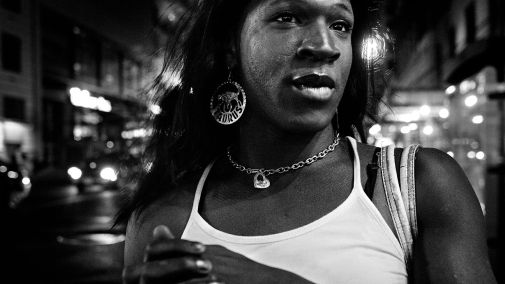HotDocs Corner: 'The Stroll' Reclaims the Narrative
 Thursday, April 27, 2023 at 6:00PM
Thursday, April 27, 2023 at 6:00PM We are looking at some of the movies playing Canada's beloved HotDocs festival. First up is buzzy Sundance hit, The Stroll.

The conversation around Jennie Livingston's iconic 1990 documentary Paris is Burning has been happening for many years now. The conversation that its white cis director profited financially and professionally from the lives of its black and latinx trans subjects who got very little out of its production. Whatever one thinks of it, it's hard to deny that as much as a film like The Stroll is needed today, it was also needed back then, too. Co-directed by Kristen Lovell and Zackary Drucker—two women directors who identify as transgender—The Stroll is the continued reclamation of trans stories on screen by those who have lived and breathed the life that it documents.
As you might expect, with this comes a lot of emotions to unpack. But Lovell and Drucker have crafted a film (the former’s first, the latter’s first feature after the 2021 series The Lady and the Dale) that reverberates for many more reasons than just representation.
Like another 2023 Sundance title, Kokomo City, The Stroll is about the lives the black transgender sex-workers. Their beat was New York City’s 14th Street in the once unfashionable Meatpacking District, east of the piers and north of Christopher Street. Through extraordinary archival footage, the viewer is taken back to the 1970s through to the ‘90s, as these women found a community. Many there had been kicked out of the family home at one time, and turned to sexwork as a means to survive. But by the turn of the century, gentrification swept through and harsher police punishments became more and more common for its vulnerable inhabitants.
The Stroll opens with Lovell herself talking about how she was once the subject of a movie—a 2007 short documentary called Queer Streets—and thought that was maybe her ticket out of this life. It wasn’t. Disappointed in how often stories about transgender people and about sexwork were too often told by outsiders, she has now teamed up with Drucker to make this rather beautiful film. Probably because of this, the talking heads throughout have the atmosphere of friendly truthtellings. There is a frankness here, that’s necessary. But in that is an understanding between interviewer and subject, a comfort, that means it never revels in trans trauma or exploits their story. It’s maybe a small thing, but its noticeable.
The doc is aided by really wonderful 2D animations that have the effect of collage, similar to The Lady and the Dale. The movie implements this at just the right times, never using it as a crutch, with editor Mel Mel Sukekawa Mooring utilising a raft of well-researched footage when possible. Among its sources include Pay It No Mind: The Life and Times of Marsha P. Johnson, Transsexuals and I Don’t Wanna Be a Boy. Additionally, one clip of RuPaul will probably result in some very upset people who’ve never been exposed to that side of the famed drag performer.
Of course, life on “The Stroll” wasn’t easy. The directors get a lot of value out of the uneasy friction the be found in the reverential nostalgia for a particular wild west time where a genuine trans community was forged in a version of the New York City that no longer exists, and the harsh realities of what that community was forced to endure in the name of survival. I also found something quite poetic about its closing sequences, that speak to a broader queer culture finally catching up to transgender people as activist pioneers upon whose backs much of the gay rights movement was built. I hope more continue to heed that message.
Towards its end, though, The Stroll does begin to stuff a lot of extra information in as it attempts to cover a lot of very pertinent issues—most prominently police brutality, gentrification and the trans rights matter movement. At one point they even interview actual meatpackers, which was maybe not necessary. But where Lovell and Drucker’s film succeeds is in the honesty that they infuse into every moment of The Stroll. I came away from it quite emotional, invested as I was in the lives of those who are still alive to tell the story. It’s gutsy but real, much like its subjects.
The Stroll is currently playing HotDocs.
 Doc Corner,
Doc Corner,  HotDocs,
HotDocs,  LGBTQ+,
LGBTQ+,  Review,
Review,  The Stroll,
The Stroll,  documentaries
documentaries 


Reader Comments